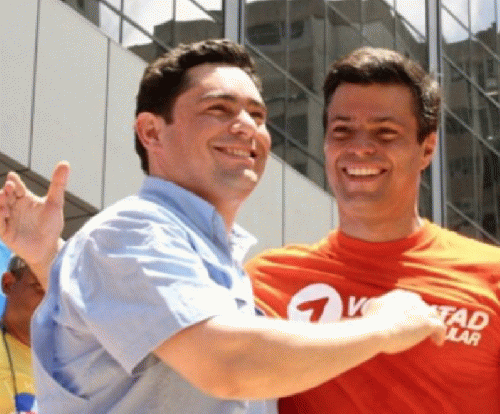In 2007, Chavez successfully forced Exxon and other foreign companies to turn over vital oil projects to the government. It was then that Vecchio emerged as a de facto spokesman for the opposition within in the oil industry, complaining in US media about "discrimination" at the hands of Chavez.
"I will be fired," Vecchio lamented in an interview with Marketplace, "because the government will discriminate against me."
According to Marketplace, by that time Vecchio had been "mount[ing] a fruitless legal challenge" to Chavez's restructuring of Venezuela's oil industry "for years."
As Exxon packed up its offices, Vecchio says he was offered a position with the company in Qatar. He rejected the consolation job, instead thrusting himself into the fight against Chavismo. "My decision [will be] staying in Venezuela to be part of change," he wrote. "I can't ask for my country to change if we aren't capable of being part of that change."
Though he had thrived in the corporate world, when it came to politics, Vecchio always seemed to come in second place. In his first bid for office, he ran in 2007 as an "independent citizen" for mayor of the wealthy, eastern-Caracas Chacao neighborhood. The district was home to Caracas high-society, offering Vecchio the perfect place to test out his Harvard Kennedy School chops.
The Chacao mayoral elections that year turned into a civil war between primary candidates competing to assume the legacy of Leopoldo Lopez. The rising star of the opposition whose claim to fame included his participation in the kidnapping of a government minister during the botched coup five years before, Lopez was barred from running for office over allegations he'd leveraged his position at PDVSA in the late 1990s in order to illegally fund the foundation of his Justice First party.
Vecchio quickly tapped out of the race, blaming his failure on an oversaturation of competition in the district. His gesture did not go unnoticed, however, as LÃ �pez personally thanked him for the decision to quit.
In his autobiography, Vecchio writes that he and LÃ �pez became "political brothers" through this episode. It was the beginning of a relationship that transformed Venezuela's opposition. Vecchio had never won an election for national office and never would, but thanks to his bond with Lopez, he wouldn't need to hold a seat in parliament to achieve the influence he yearned for.

Carlos Vecchio (L) and Leopoldo Lopez at a Popular Will party rally. (Archive)
(Image by File Poto Venezuela Analysis) Details DMCA
By late 2007, Venezuela's economy was roaring, Chavez and his allies were proving unbeatable and progressives were scoring victories in countries across Latin America. The US was desperate for any measure to roll back the Pink Tide sweeping the continent. Into the breach stepped Generation 2007, a collection of US-trained youth operatives that provided the perfect vehicle for Vecchio and Lopez to radicalize the country's opposition.
In November, thousands of middle and upper class students poured into the streets to protest the government's decision not to renew the broadcast license of Radio Caracas Television, an opposition channel that took credit for the coup that momentarily ousted Chavez years before.
The demonstrations quickly morphed into a revolt against an upcoming constitutional referendum centering around a proposal to declare Venezuela a "socialist" nation. As Max Blumenthal and Dan Cohen reported for The Grayzone, the movement was led a group of activists trained by the NED and CIA-funded Center for Applied Nonviolent Action and Strategies, or CANVAS. It was the inception of "Generation 2007."
The leaders of "Generation 2007" were directly sponsored by USAID's Office of Transitional Initiatives. As one contractor familiar with their projects explained to academics Tim Gill and Rebecca Hansen in The Nation, "the US had a very daring movement and brought a lot of money to the students through OTI, and it grew a lot as a result."
"I'm proud. It's like you see your son and daughter grow up," the contractor continued. "I knew them when they grew up"the potential leaders when [or] if there is a change of government, and we were the ones who showed them the first steps."
Before this mobilization, Venezuela's opposition was demoralized, suffering blow after another at the voting booth. But thanks to Generation 2007, they managed to deal Chavez a rare defeat, stymying his referendum to institute "21st Century Socialism." Its success brought fresh faces into the fold of US-backed NGOs, including the future coup leader, Juan Guaido, whose only mention in Vecchio's book appears in a section reflecting on Generation 2007's emergence. The stage was set for a political regrouping that would leverage the astroturfed movement's enthusiasm into real power.
In 2009, Lopez and Vecchio founded Popular Will, a party that reflected the interests of Venezuela's business class and the radical, no-compromise sensibility of its youthful leadership.
Next Page 1 | 2 | 3 | 4 | 5 | 6 | 7 | 8 | 9 | 10
(Note: You can view every article as one long page if you sign up as an Advocate Member, or higher).





